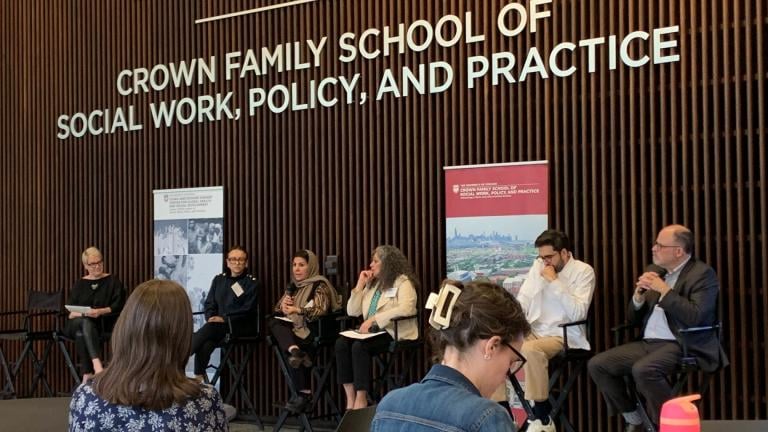Allies of Mayor Brandon Johnson blocked a vote on Wednesday on a plan to purchase the now-vacant Jewel-Osco and surrounding parking lot near 115th and Halsted streets for $1 and transform it into a shelter for some of the 3,317 men, women and children being forced to sleep on the floors of police stations across the city and at O’Hare Airport.
The proposal to purchase the 67,000-square-foot vacant former grocery store and the surrounding 6.5 acres of land on the border between Morgan Park and West Roseland once known as the Halsted Indoor Mall could come back for a vote at the next regular meeting of the Chicago City Council, set for Nov. 7. However, the delay is an indication the plan could be in significant peril.
Alds. Carlos Ramirez Rosa (35th Ward) and Byron Sigcho Lopez (25th Ward) used a parliamentary procedure to delay the vote abruptly during an emotional debate over the issue. Both are two of Mayor Brandon Johnson’s top City Council allies.
The blocked vote is another example of the intense backlash that has complicated efforts by Johnson and his administration to care for the more than 20,000 people who have made their way to Chicago from the southern border after entering the country legally after requesting asylum.
Ald. Ronnie Mosley (21st Ward) indicated he would vote against the plan. The alderperson, who took office in May, told WTTW News before Wednesday’s City Council meeting he was “disappointed” by Johnson’s decision to ignore his opposition.
“Our community came out and said strongly that this is not something that we want,” Mosley said. “There’s still a lot of reaction to that and a lot of questions. What does this mean for the project at that site? What does this mean for our community that’s been suffering? How will we be made whole and how will we be made better?”
Approximately a dozen alderpeople indicated they would also vote against the plan, throwing the proposal’s future into doubt. Typically, the city’s decades-old tradition of aldermanic prerogative would give Mosley a veto over such a high-profile development, especially one that was roundly criticized by nearby residents at a community meeting back in September when the proposal was just a rumor.
But Johnson has made it clear that the humanitarian crisis confronting the city means that alderpeople will not be able to stop the opening of shelters.
Many alderpeople said they would defer to Mosley, and said they would expect their colleagues to do the same if their roles were reversed.
Temperatures have hovered below freezing for much of the past 48 hours, ratcheting up the pressure on Johnson to find somewhere for the more than 2,800 people living at Chicago police stations, many in tents ill-equipped to keep out the winter chill, snow or rain.
City officials plan to build a massive “winterized base camp” on what is now a vacant parking lot, Mosely said. It is also unclear how many people could be housed on the site, or when the shelter could open.
Mosley said safety was his biggest concern.
“Safety is the biggest thing,” Mosley said. “We are going to have a large population in the downtown part of our ward. How is that going to impact our residents nearby, businesses that are there? We just had Walgreens close. We don’t want other ones to close. We want more businesses there.”
Mosley acknowledged efforts to care for the migrants have exacerbated tension between Chicago’s Black and Latino communities, with many Black leaders feeling deep frustration that the city is spending millions of dollars to house mostly Latino immigrants in Black communities that have suffered from decades of disinvestment, grinding poverty and rampant crime and violence.
“This really puts a face to this issue,” Mosley said. “That site has been abandoned for decades. Folks have been told that this is coming there, and it never comes. Same things that we talk about as Black Americans in this country that election after election we are promised that these things will come, and they don’t.”
Mosley said the Johnson administration had yet to agree to a series of demands he made after it was announced that a migrant shelter would open in his ward, including support for the Beverly Ridge housing development, improvements at Julian High School and “investments in the beautification of our ward.”
Mosley also demanded a full commitment from the city to break ground next year on a development dubbed Morgan Park Commons, an affordable housing, retail, entertainment and new park space on the site. The plan presented to the Housing Committee said the city plans to donate the land to the project’s developer, the Far South Community Development Corp.
President Abraham Lacy said in a statement to WTTW News that the corporation remains committed to breaking ground on Morgan Park Commons in 2024 with the recently reaffirmed support of state and city officials.
The number of migrants sent to Chicago in the last 30 days has grown more than 30%, with the number of migrants at police stations and O’Hare growing by more than 50%, even as the mayor’s office opened several new shelters in recent weeks.
City officials have yet to make a final decision on whether to build a massive “winterized base camp” on a vacant lot near 38th Street and California Avenue in Brighton Park. That site could house as many as 2,000 families, officials said.
As part of a planned move, allies of the mayor also moved to delay a vote on a proposal that would give the Chicago City Council the power to hike taxes on the sales of properties worth $1 million or more to fight homelessness.
That proposal cleared the City Council’s Rules Committee Tuesday on a vote of 32-16, but needs the approval of the final City Council before voters can vote on the measure as part of the March primary ballot.
Contact Heather Cherone: @HeatherCherone | (773) 569-1863 | [email protected]








